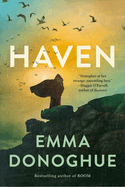
In Emma Donoghue's deliciously claustrophobic 12th novel, Haven, three seventh-century monks set sail for an island off the coast of Ireland. Their project of founding a new monastery will be beset by scarcity, personality clashes and everyday disasters.
Artt has a dream, "an instruction to withdraw from the world. To set out on pilgrimage with two companions... and found a monastic retreat." He chooses 19-year-old Trian and Cormac, an older man. This shabby trinity leaves the monastery in a small boat packed with meager supplies. A fraught journey delivers them to the Great Skellig, a craggy island where their days are marked by privation and repetitious tasks. A dropped bag of flour or an infected leg wound could mean the difference between life and death. Although the rituals of daily prayer and weekly Communion, and the recounting of legends, feed the soul, the body is another matter: "Hunger is a constant argument."
The Great Skellig, previously unvisited by humankind, seems like a kingdom of seabirds. The novel is saturated with the sight and sound of thousands of birds. Donoghue (The Wonder; Frog Music) excels at creating isolated atmospheres and examining the dynamic of small casts of characters. Haven may be just one letter away from heaven, but this island community looks less like either and more like a prison as time goes on. A powerful study of religious obsession and confinement, this is one for readers of Matrix and To Paradise. --Rebecca Foster, freelance reviewer, proofreader and blogger at Bookish Beck

